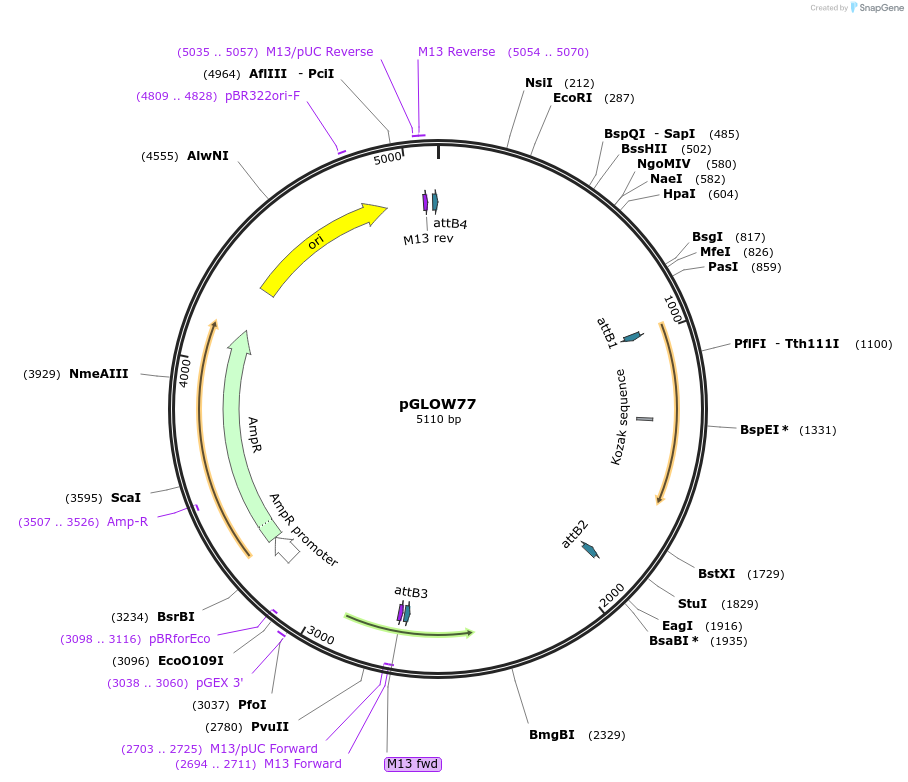pGLOW77
(Plasmid
#177338)
-
PurposeC. elegans mNeonGreen co-injection marker
-
Depositing Lab
-
Sequence Information
Ordering
| Item | Catalog # | Description | Quantity | Price (USD) | |
|---|---|---|---|---|---|
| Plasmid | 177338 | Standard format: Plasmid sent in bacteria as agar stab | 1 | $89 | |
Backbone
-
Vector backboneN/A
- Backbone size w/o insert (bp) 2445
- Total vector size (bp) 5110
-
Vector typeWorm Expression
Growth in Bacteria
-
Bacterial Resistance(s)Ampicillin, 100 μg/mL
-
Growth Temperature37°C
-
Growth Strain(s)DH5alpha
-
Copy numberHigh Copy
Gene/Insert
-
Gene/Insert namePmyo-2::mNeonGreen
-
Alt namePmyo-2::mNG-C1::unc-54utr
-
SpeciesC. elegans (nematode)
-
Insert Size (bp)2663
- Promoter myo-2
-
Tag
/ Fusion Protein
- mNeonGreen
Cloning Information
- Cloning method Gibson Cloning
- 5′ sequencing primer CCCAGGGAAAAAGAAGGGCT
- 3′ sequencing primer GGGAGCACAGGGAGAAAGAG
- (Common Sequencing Primers)
Resource Information
-
Supplemental Documents
-
A portion of this plasmid was derived from a plasmid made byDerived from pGLOW30 (Addgene #172697) and pDD268 (Addgene #132523)
-
Article Citing this Plasmid
Terms and Licenses
-
Academic/Nonprofit Terms
-
Industry Terms
- Not Available to Industry
Trademarks:
- Zeocin® is an InvivoGen trademark.
Depositor Comments
C. elegans codon-optimized mNeonGreen. Use as an array marker for CRISPR or as a general co-injection marker. Very bright mNG fluorescence in pharyngeal muscle. Inject at 2.5 ng/uL. Made by George Huang (Glow Worms '20).
pGLOW77 has 11 random mutations relative to the pCFJ90 backbone that do not affect plasmid function.
These plasmids were created by your colleagues. Please acknowledge the Principal Investigator, cite the article in which the plasmids were described, and include Addgene in the Materials and Methods of your future publications.
-
For your Materials & Methods section:
pGLOW77 was a gift from Ryan Doonan (Addgene plasmid # 177338 ; http://n2t.net/addgene:177338 ; RRID:Addgene_177338) -
For your References section:
mScarlet and split fluorophore mScarlet resources for plasmid-based CRISPR/Cas9 knock-in in C. elegans. Witten G, DeMott E, Huang G, Zelasko F, de Jesus B, Mulchand C, Schuck L, Pullman S, Perez A, Mahableshwarkar P, Wu Z, Cardona EA, Pierce JT, Dickinson DJ, Doonan R. MicroPubl Biol. 2023 Jun 14;2023:10.17912/micropub.biology.000871. doi: 10.17912/micropub.biology.000871. eCollection 2023. 10.17912/micropub.biology.000871 PubMed 37396790



